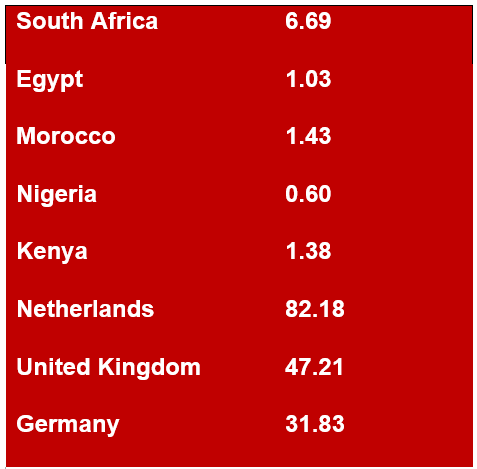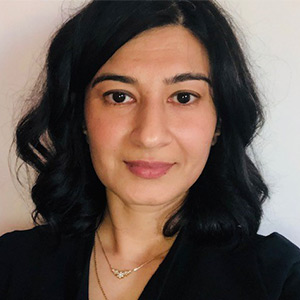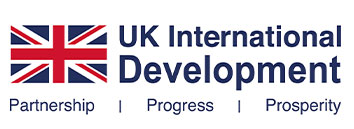The opportunity to leverage AI for development
In Africa, AI presents an opportunity to make notable strides in sectors such as financial services, healthcare, agriculture, education, and climate resilience and adaptation, advancing the achievement of the Sustainable Development Goals (SDGs). AI-based technologies can significantly accelerate the growth rate of African countries if leveraged effectively (Figure 1).
Figure 1: Projected growth of African continent’s GDP until 2030
GDP of African continent in USD (trillions, current) by year, with and without the adoption of AI technologies

Source: OECD.AI, National AI policies and strategies, 2023
According to the State of AI in Africa Report (2022), there are over 2,400 AI start-ups in the region. However, these are concentrated in only a few markets and sectors, and the potential for AI to advance socio-economic development remains underutilised.
We are observing some momentum in the adoption of AI in healthcare and financial services, as well as in agriculture and climate resilience, albeit at a slower pace. In financial services, AI is playing an increasing role in facilitating risk scoring for lending and insurance products, particularly for populations traditionally excluded from essential financial services. Examples include the fintechs Jumo and MNT Halan.
AI has the potential to be transformative in healthcare. It can analyse public health behaviour, predict and prevent the outbreak of communicable diseases, ensure efficient supply chains for medicines at pharmacies, and enhance triage and administration systems at healthcare facilities. Between 2020 and 2021, the GSMA facilitated partnerships for the use of mobile big data (MBD) in a number of countries including the Democratic Republic of Congo (DRC), Rwanda, Benin, and Burkina Faso, to support the COVID-19 response. Population mapping through MBD analysis proved invaluable in predicting the movement of the Coronavirus, enabling timely critical responses. African healthcare start-ups such as Deep Echo in Morocco and Diagnosify in Ghana are currently leveraging AI to enhance diagnostics, while Nigeria-based HealthTech RxAll is using AI to combat counterfeit and substandard medications.
In agriculture, AI-enabled precision agriculture solutions are optimising yields, improving agricultural supply chains, and enhancing access to resources. Notable examples are Hello Tractor and Crop2Cash, two GSMA grantees and attendees at our AI roundtable at MWC Kigali, the GSMA’s annual gathering of policymakers and leaders in connectivity in Africa. Both start-ups are using AI to enable small-holder farmers to access farm equipment and financing, respectively.
New GSMA research on AI use cases
GSMA Mobile for Development is currently researching emerging use cases for AI for development in Kenya, Nigeria and South Africa, building on GSMA’s extensive work in shaping global partnerships to accelerate the ethical use of MBD and AI to achieve the SDGs. To advance the research, in October 2023, we convened a group of AI experts at a roundtable at MWC Kigali.
The discussion centred around key challenges to developing responsible and inclusive AI solutions for socio-economic development. Roundtable attendees, including private sector organisations, non-governmental organisations, and international development agencies, discussed the fundamental enablers for ethical and inclusive AI initiatives for social good; the availability of contextualised, structured and high quality data in local languages; the availability of AI skills at all levels, from school curricula to universities and policy makers, as well as private sector (e.g. start-up innovators); the presence of enabling infrastructure, not only reliable connectivity but also cloud computing services, supercomputers and data centres.
It starts with data
Inclusive AI requires local Big Data sets to inform AI models. At the point of service delivery, AI-enabled interfaces, such as chatbots, are playing an increasingly important role in delivering a valuable, tailored experience to end users in local languages. Roundtable participants highlighted a dearth of local, national, and regional datasets that can be used to train AI models in local languages but also emphasized that collecting this data is both expensive and time-consuming.
Roundtable attendee Viamo, which enables international development organisations and businesses to reach the last mile via digital messaging on feature phones, has been piloting improvements in its digital interface. Viamo found that voice-based interactions in local languages are preferred over text-based interactions by many end-users in the region. However, voice data is particularly challenging to collect, especially with the large number of languages used in the region.
New initiatives have emerged that aim to build locally relevant models. For example, roundtable participant Digital Umuganda, an AI company that specialises in language technology for African languages, is building an open-language database collecting Kinyarwanda (Rwanda’s main language) voice and text datasets on the Mozilla common voice platform. The platform is hosted by the Mozilla Foundation, a non-governmental organisation that also participated in the roundtable. The Foundation is ensuring equal access to the internet by supporting open-source voice datasets in different languages and accents, with a view to democratise and widen access to voice data.
The overlooked enabler: AI systems
Scaling AI in Africa necessitates robust digital infrastructure, encompassing dependable and low-latency connectivity, sufficient data storage capacity, and affordable data processing hardware.
Roundtable participants, including development partners such as the GIZ and FCDO, regional AI start-ups and NGOs, highlighted that the current infrastructure falls short of meeting the demands of large-scale AI initiatives. The handling of big data for AI applications, for example, involves extensive storage requirements. A 2023 report from market research firm DC Byte on data centres in Africa reveals limited capacity, even in leading markets in comparison to countries in Europe (Table 1). However, growing demand is driving investments in data centres in more advanced markets such as Egypt and Nigeria.
Table 1: IT capacity (Megawatt per million/population)

Source: DC Bytes; Africa’s Key Data Centre Markets
Cloud storage solutions also require consistent and high-speed connectivity and network capacity, which remains a challenge in many parts of Africa, compounded by inconsistent power supply.
Currently, over 70% of data from Africa is hosted elsewhere, though this is shifting. Many African countries are concerned about data privacy and breaches with data hosted outside national boundaries. Others, such as Tanzania, have legally restricted cross-border data flows, but with the absence of corresponding network and data storage capacity within the country, this can pose a significant challenge for AI startups. In addition, restrictions on cross-border data flows can limit AI applications, which rely on the integration of large amounts of data.
Upskilling is needed across multiple ecosystem actors
The lack of AI skills has also emerged as a key challenge in discussions with roundtable participants. Despite the availability of open datasets (e.g., geospatial data), a lack of proficient IT specialists to construct AI models is impeding private sector innovation. While governments, donors, development partners, private sector tech companies, universities, and NGOs are involved in upskilling youth, these efforts are fragmented and limited. Larger-scale and better-coordinated upskilling programs, facilitated through public-private and third-sector partnerships, are likely to have a more significant impact.
Cost-free, open-access online training in AI is available, but there is limited evidence of its efficacy, and many youth are unable to access available resources due to insufficient literacy, a lack of content in local languages, and limited access to devices and mobile data.
Most importantly, for long-term and sustainable digital transformation via emerging technologies such as AI, countries need to reassess how they can foster a culture of innovation across the tech ecosystem.
Upskilling is also imperative across various sectors, including academia, non-governmental organisations, and the public sector. Government officials and regulators, in particular, need to comprehend the technology, understand its limitations and associated risks, and identify potential use cases for development. This understanding is crucial for formulating a forward-looking yet responsible AI policy and regulating AI effectively.
Rwanda is the first country in Africa to devise a National AI policy, and regulators have benefitted from an inclusive approach which other countries could emulate, engaging local experts as well as collaborating with regional and international actors in extending their knowledge to build a robust, ethics-based, inclusive AI policy.
Connect with us
In the coming months, GSMA Mobile for Development will identify key opportunities and use cases in AI for sustainable development in Africa and deep dive into the data, infrastructure and skills challenges summarised above. We will be sharing our findings along the way. If you are a practitioner or expert in inclusive, ethical AI for sustainable development, you can connect with us at [email protected] to find out more and participate in advancing our research.
THE CENTRAL INSIGHTS UNIT IS CURRENTLY FUNDED BY THE UK FOREIGN, COMMONWEALTH & DEVELOPMENT OFFICE (FCDO), AND SUPPORTED BY THE GSMA AND ITS MEMBERS.



